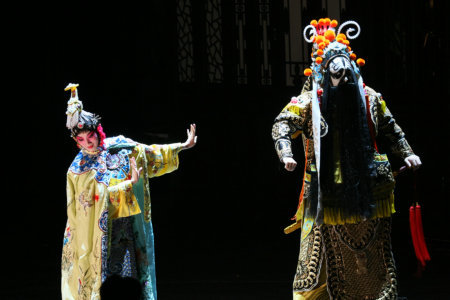This year's Beijing Music Festival will wrap up Sunday with its closing gala the world premiere of opera Song of Farewell. The Chinese production is being hailed as a milestone work for the new era of Chinese opera.
|

A scene from Song of Farewell.
|
Inspired by the film
Farewell My Concubine,
Song of Farewell is set in Beijing in the 1920s. With a traditional Chinese backdrop and performed in Mandarin with English subtitles, the Western opera is about a young talented screenwriter Tang Qisheng who falls in love with Peking Opera actor Yang Shaoshan and writes the screenplay
Farewell My Concubine for Yang. The opera elevates Yang to fame, but ends with the tragic death of Tang.
"Chinese opera should not just follow the way of Western opera, but should be China's own and introduce Chinese art to the world," commented Yu Long, acclaimed conductor and founder of the festival. According to Yu, Song of Farewell is a world-class opera with professional production, aesthetics, a rich culture and an international vision.
"What's more important, it is a pure Chinese opera production," he added.
Co-produced by Beijing Music Festival Art Foundation, Shanghai Opera House and Shanghai Symphony Orchestra, the work is a seemingly fitting end to the 21-day, 13th Beijing Music Festival.
"It is the most important Chinese opera so far and will certainly start a new era for Chinese opera," commented Zhang Guoyong, conductor of the opera and vice president of the Chinese Musician's Association.
"About three or four years ago, I had the idea of an original Chinese opera, especially with a Peking Opera element, therefore we wrote Song of Farewell with a Peking Opera story and a love theme, which is universal. There are no boundaries between Peking Opera and Western opera or any art forms," Ye Xiaogang, composer of Song of Farewell, told the Global Times.
"I believe it is the first clear and bold demonstration of gay love and human love in the history of Chinese opera. Although the love ends in a tragedy, the purity of true love is well presented," Ye added.
According to Ye, the opera appears to be conservative and traditional with its 1920s Peking Opera storyline, but it actually has radical and pioneering elements, a mix of old values with avant-garde spirit and behaviors.
"It is about a strong romantic character fighting with his time and its values, eventually choosing death to farewell his lover and also his time. It is very bold and radical even in present day," Ye said.
Running for two hours with an intermission, the opera consists of four acts: Meeting, Commitment, Wandering and Farewell. According to Zhang, the opera is different from those of Verdi and Puccini's and it is rather Wagner in style with Chinese music elements.
"It is hard to mix Peking Opera with Western opera, for instance, Peking Opera sings with dancing and body movement, Western opera sings with exaggerated hand movements; there is also no conductor in Peking Opera. Therefore, it is a real challenge to have Peking Opera actors and Western opera actors on the same stage," Ye explained.
Ye said that he avoided Peking Opera singing, but kept the body movements. "The leading actor Yuan Chenye (Yang Shaoshan), a Western opera singer, actually went to a professional Peking Opera house to learn Peking Opera's body movement and adjust his previous Italian way of stage performance," Ye explained. "After all, Song of Farewell is still a Western opera, only with a Peking Opera writer's story."
Song of Farewell also uses traditional Chinese instruments such as the pipa, erhu and dizi.
The opera will stage tomorrow and Sunday at Poly Theatre before touring major Chinese cities and playing at the top European opera houses.
(Global Times October 29, 2010)